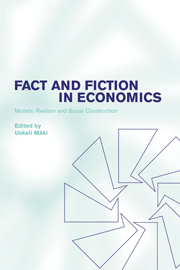Book contents
- Frontmatter
- Contents
- Notes on the contributors
- Preface
- I Introduction
- II Setting the scene
- III Economic models and economic reality
- IV The constitution of economic reality
- 11 Rational choice, functional selection, and “empty black boxes”
- 12 The reality of common cultures
- 13 Collective acceptance and collective attitudes: on the social construction of social reality
- 14 Hayek and cultural evolution
- 15 Putting evidence in its place: John Mill's early struggles with “facts in the concrete”
- V The institutions of economics
- Index
- References
14 - Hayek and cultural evolution
Published online by Cambridge University Press: 22 September 2009
- Frontmatter
- Contents
- Notes on the contributors
- Preface
- I Introduction
- II Setting the scene
- III Economic models and economic reality
- IV The constitution of economic reality
- 11 Rational choice, functional selection, and “empty black boxes”
- 12 The reality of common cultures
- 13 Collective acceptance and collective attitudes: on the social construction of social reality
- 14 Hayek and cultural evolution
- 15 Putting evidence in its place: John Mill's early struggles with “facts in the concrete”
- V The institutions of economics
- Index
- References
Summary
Introduction
Realism has entered economics in diverse ways. One fairly common exercise is to provide a realist interpretation of the work of some famous economist. The economists whose works are reconstructed typically did not explicitly endorse realism, but rather elements of their work had aspects that permitted a realist reinterpretation.
The Austrian economist F. A. Hayek is a case in point. Both Tony Lawson and Steve Fleetwood have portrayed Hayek as an early, if imperfect, proponent of transcendental realism. Lawson argues that Hayek's views went through a “continuing transformation.” He applauds Hayek's attack on positivism in the latter's wartime “Scientism” essay (Hayek [1942–44] [1952] 1979), but finds Hayek's alternative proposals there, which Lawson characterizes as a variant of hermeneutics, to be inadequate (Lawson, 1997, 149). Elsewhere, though, Lawson claims that in Hayek's later contributions one can find an “at least embryonic acceptance of something like a transcendental realist ontology,” hence the conclusion of Hayek's having undergone a continuing transformation (Lawson, 1994, 151). The suggestion that Hayek turned towards realism in his later work is addressed in greater detail in Fleetwood's Hayek's Political Economy: The Socio-Economics of Order (1995). Though he prefers a periodization of Hayek's work to Lawson's notion of a continuing transformation, Fleetwood agrees that after 1960 one can find ample evidence for what he calls “Hayek III's quasi-transcendental realism” (Fleetwood 1995, chapter 6). Fleetwood offers an extended realist reconstruction of Hayek's writings on the role of rules.
- Type
- Chapter
- Information
- Fact and Fiction in EconomicsModels, Realism and Social Construction, pp. 285 - 303Publisher: Cambridge University PressPrint publication year: 2002
References
- 11
- Cited by



